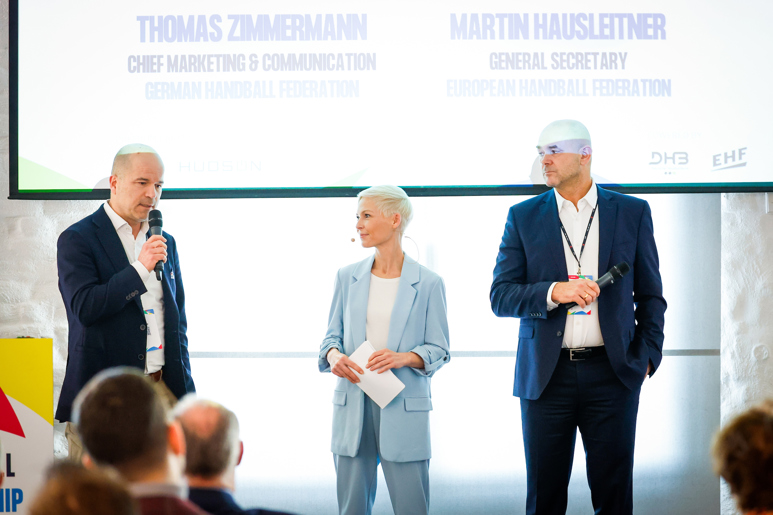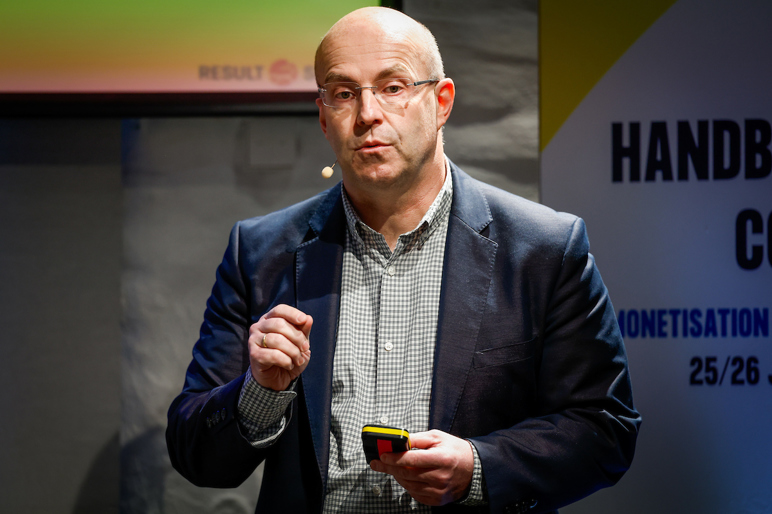Some 180 attendees, including ex-athletes and federation officials packed the hall at the museum along the scenic bank of the river Rhine. Guests were treated to two days of intriguing talks, with a vibrant networking evening at the Wasserturm Hotel after day one and a relaxed morning breakfast to get day two underway.
The first day “threw off“ with introductions from the chief of marketing and communications at DHB, Thomas Zimmerman, and EHF secretary general, Martin Hausleitner, alongside the event moderator Anett Sattler. With a warm welcome to Cologne, they shared their excitement about the conference and the ongoing EHF EURO, both of which they expressed high hopes for. The three key pillars of the event – monetisation, sustainability and digitalisation – were summarised in their importance for the growth of handball.
A programme of key speakers offering their expertise included the CEO of DYN, Andreas Heyden, the managing director of the NFL Germany, Dr Alexander Steinforth, and the managing director of RESULT Sports, Mario Leo.

Offering his thoughts on the conference, Zimmerman said the event “shows handball is a lot more than just a sport.” With the handball world tapping into many business topics, Zimmerman emphasised that the event aims to “professionalise the handball business even more than it is today.”
“We highlight a lot of aspects in the marketing, digital and sustainability sides of the sport and promote these for the growing handball business.”
Digitalisation in handball overlapped with many of the topics, a range of speakers provided cutting analysis into its importance. The head of sports operations DACH at TikTok, Nina Tsimpouli, shared the breadth of opportunities TikTok offers to handball in her talk entitled “Winning content on TikTok: Gen Z & beyond”.
Digital marketing/CRM lead at the EHF, Eleanor D’este, shared a data-driven approach to fan engagement, offering a fascinating plethora of holistic approaches to researching target audiences including personalisation and retargeting. “Using data to understand what you are offering” was outlined as key. A main takeaway of this talk was that, in the digital era, driving growth in sports through data is a proven strategy.
The managing director of RESULT Sports, Mario Leo, drew the audience in with his talk “Social media: far more than communication”. From the relationship between dopamine and digital media to the wide range of audiences found in different social media platforms, Leo provided a comprehensive dive into the best business practices and finding the right audience on social media for handball.

The hot topic of sustainability was covered in depth, with a bulk of day one addressing its importance and nuance. Board member for sustainability and development at Füchse Berlin and co-chairman of task force sustainability handball Bundesliga, Christopher Jahns, discussed the question “Sustainability as a game changer in professional handball?”
Sharing key insights into ESG, the EHF strategy’s alignment with 17 UN sustainable development goal standards and the case study of Füchse Berlin, he showed where handball stands and what can be achieved at club, league and EHF level. Ultimately, the talks title question was answered with a conditional “yes” sustainability can be a game changer, but only if “we take it seriously, are credible, are accountable, share best practices, learn it, have strong business partners with financial support and expertise, are passionate and have fun doing it.”
Jahns was later joined on stage by the commercial sustainability manager at ClimatePartner, Martin Michelberger, and the general manager at Velomax Berlin Hallenbetriebs, Sebastian Rüß. Together, they tackled the question of how the carbon footprint of clubs, leagues, arenas and events can be measured. Which ESG and sustainability strategies should be used as a guide? What reduction measures can be derived from this? Does professional sport have to contribute to the financing of climate protection measures?
Regarding the monetisation of handball, business leaders shared insights on a range of sports in which the growth of the sport has developed alongside its monetisation.
Managing director of Germany NFL, Alexander Steinforth, shared a thorough analysis of the marketing strategy of the sports giant. Elaborating on the NFL’s historical internationalisation and how fan growth is a dominant KPI, a lot of transferrable lessons were apparent. In answer to a question regarding competition in sports marketing, he stated “there’s enough room for everyone in Germany” when it comes to sports.
Another big name in the world of sports business, CEO of DYN Media, Andreas Heyden, talked about DYN behind the streams and how the growth of the sport functions in harmony with the centralisation of it being accessible on one platform. Emphasising the point that Google searches of handball have increased massively in the last year, Heyden added that what is offered by DYN “is content made by fans, for the fans”.
Discussing handball growth, the head of the delegation at the Georgian National Handball Federation, Salome Oniani, shared her knowledge of the example of Georgia and its history. In researching handball's growth in her nation, Oniani outlined the crucial role marketing played in the development, with matters such as modernising communications and pushing initiatives proving valuable.
On the importance of the Handball Leadership Conference, Salome stated: “I think we are in the new era of handball. It is very important, if you want to transition, to know all three topics (monetisation, digitalisation and sustainability.) In technology and all sports areas, these areas have become necessities to develop.”

After the sociable networking event with a scenic 360 degree view of Cologne the evening before, day two of the conference took place in the setting of round tables and breakfast. The morning offered a comfortable environment for guests to enjoy the remaining key talks. First on the agenda, the upcoming Paris 2024 Olympic Games was addressed. The organisation of the handball tournament was put into context by the manager of handball for Paris 2024, Camille Guichard.
Finally, to wrap up the landmark event, the future of handball was discussed by three managing directors: Jennifer Kettemann of Rhein-Neckar Löwen, David Szlezak of EHF Marketing and Gerd Butzeck of Forum Club Handball, as well as the chairman of the board at DanskHåndbold, Morten Stig Christensen.
The discussion took on the question: has this future possibly already begun? And where does the course still need to be set so that professional handball can even expand its position among the top sports in Europe? The exciting future of the ever-growing handball world looked to tomorrow as these top experts shared their thoughts on professionalisation, data, challenges and trends.

























